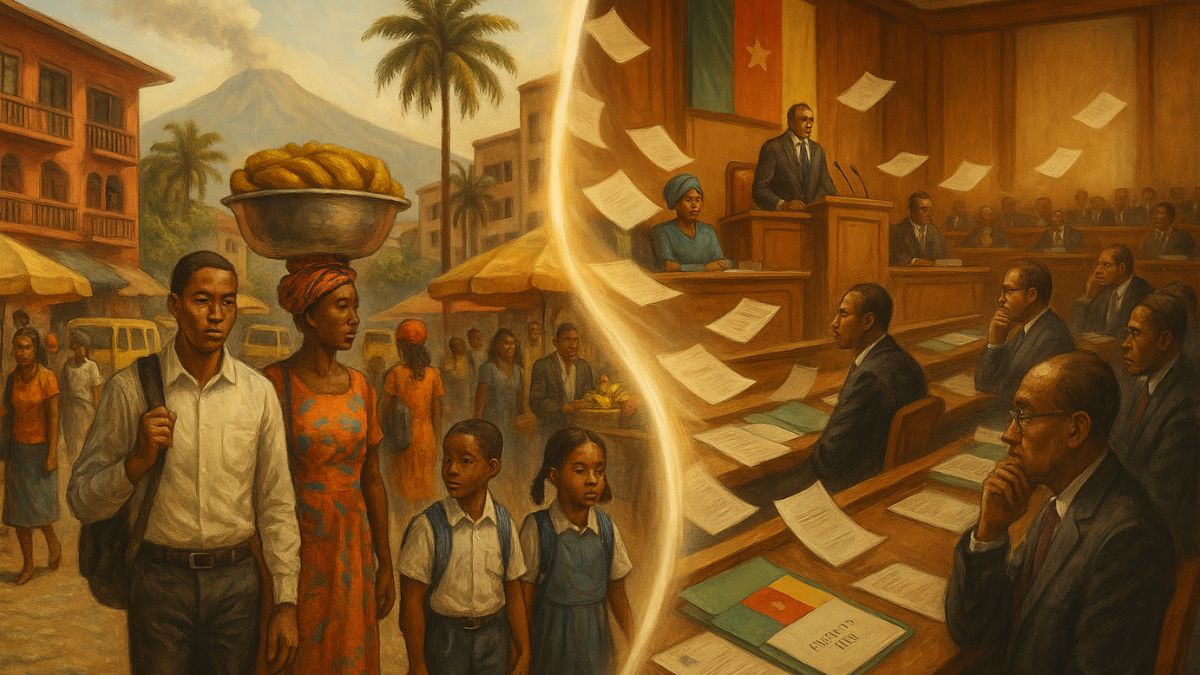Politics is often viewed as the distant domain of elites and lawmakers, but in reality, political decisions have a profound impact on the daily lives of ordinary Cameroonians—from the food they eat and the jobs they hold, to the roads they travel and the freedoms they enjoy.
This article explores how political decisions affect everyday life in Cameroon, highlighting the direct and indirect consequences of governance on education, healthcare, infrastructure, employment, security, and personal freedoms. In a nation as diverse and complex as Cameroon, understanding the link between politics and daily life is essential for citizens and policymakers alike.
The Nature of Politics in Cameroon
Cameroon is a unitary presidential republic with centralized power under the executive branch, especially the presidency. Since 1982, President Paul Biya has held the highest office, and political decisions are heavily influenced by the ruling party—the Cameroon People’s Democratic Movement (CPDM).
While multiparty democracy was introduced in the 1990s, many political decisions are still made at the top, with limited citizen participation and accountability. This centralization deeply shapes the quality of life for citizens across regions and social classes.
1. Political Decisions and Education
A. Curriculum and Language Policy
The decision to implement two distinct educational systems (Francophone and Anglophone) has fueled discontent, especially in the Northwest and Southwest regions. Political inaction on harmonizing the system or responding to demands for reform has sparked the Anglophone Crisis, disrupting education for thousands of students.
B. Infrastructure and Staffing
Education budgets are controlled centrally. As a result:
- Schools in rural areas lack teachers and materials.
- University infrastructure in some regions is outdated.
- Strikes by teachers over unpaid salaries are common.
A 2023 teachers’ strike (the “OTS Movement”) over political delays in wage reform led to school closures, impacting millions of families.
2. Healthcare Access and Outcomes
Political decisions on health budgets, hospital management, and drug procurement directly affect the quality and affordability of healthcare.
- Delayed infrastructure projects, such as the Bamenda Referral Hospital, are tied to political favoritism or corruption.
- COVID-19 vaccine distribution was hampered by poor planning and politicized messaging, leading to vaccine hesitancy.
- Chronic underfunding of rural clinics forces citizens to travel long distances or rely on informal medicine.
The result? High maternal mortality, low life expectancy in rural areas, and growing public distrust in state hospitals.
3. Infrastructure and Transport
Political decision-making plays a major role in determining which towns get roads, bridges, or electricity, often based on political allegiance rather than need.
A. Road Construction
- Projects like the Yaoundé-Douala highway and Kribi Deep Sea Port are concentrated in politically strategic regions.
- Many roads in the Far North, East, and Anglophone regions remain unpaved, impacting farmers, traders, and commuters.
B. Urban Planning
Decisions around city development are centralized, leading to:
- Poor drainage and seasonal flooding in cities like Douala.
- Limited investment in public transportation systems.
- Informal settlements and overcrowded housing.
4. Employment and Economic Opportunity
Government decisions on tax policy, regulation, and public sector hiring have a direct impact on employment and household income.
A. Public Sector Employment
- Recruitment into the civil service is often opaque and influenced by patronage.
- Political instability in certain regions (e.g., the Anglophone zones) has reduced job availability.
B. Youth Unemployment
- Despite being a major political talking point, policy reforms to support youth entrepreneurship and job creation remain poorly implemented.
- Government-backed microfinance initiatives often suffer from mismanagement.
C. Private Sector Environment
Political decisions on:
- Import restrictions
- Business registration
- Taxation levels
… all affect local businesses. Bureaucracy and corruption discourage foreign investment and limit private sector growth.
5. Justice and Personal Freedom
Citizens’ freedom of speech, right to assembly, and access to justice are directly tied to political decisions and legal enforcement.
- Arbitrary arrests of journalists and opposition figures (e.g., post-election protests in 2018) send a chilling message about civic expression.
- Delayed court cases and limited access to legal aid affect daily life, especially for the poor.
- Regional disparities in the application of law—some communities experience over-policing, while others suffer from state neglect.
6. Security and Conflict
Perhaps the most visible impact of political decisions is in the realm of national security.
A. The Anglophone Crisis
A lack of dialogue, dismissive political rhetoric, and a military-first approach to the demands of Anglophone protesters in 2016 have led to:
- A full-blown insurgency
- Mass displacement (over 700,000 internally displaced)
- Closure of schools and hospitals
- Daily insecurity for residents in the Northwest and Southwest
B. Far North Insurgency
Decisions around border security and community engagement in the fight against Boko Haram impact whether communities feel safe and protected.
7. Environment and Public Services
Political neglect in environmental planning has worsened climate-related vulnerabilities:
- Deforestation in the South and East continues unchecked due to weak enforcement of environmental laws.
- Flooding in Yaoundé and Douala is exacerbated by poor urban policy and non-existent drainage maintenance.
- Water and electricity supply are unreliable in many cities due to underinvestment and monopolistic state agencies.
Why Civic Participation Matters
Understanding how political decisions affect everyday life in Cameroon should encourage greater civic engagement.
- Voting in local and national elections can shift the balance of power.
- Community organizing and advocacy can push for better schools, roads, or healthcare.
- Holding elected officials accountable improves transparency and service delivery.
Unfortunately, civic participation is often low due to:
- Disillusionment with the political class
- Fear of state retaliation
- Lack of civic education in schools
Recommendations for Change
To ensure political decisions improve rather than harm daily life, Cameroon must:
- Improve Transparency in decision-making and budgeting.
- Invest in Decentralization so local governments can address local needs more effectively.
- Promote Civic Education across schools and media.
- Strengthen Civil Society to check state power and advocate for citizen needs.
- Encourage Youth Involvement in politics and community leadership.
Conclusion: Why Politics Matters
Whether you’re a market vendor in Buea, a university student in Yaoundé, or a farmer in Maroua, politics touches every aspect of your life—from the taxes you pay to the roads you use, the hospitals you visit, and the freedoms you exercise.
Understanding how political decisions affect everyday life in Cameroon is not only essential for informed citizenship—it is also the first step toward holding leaders accountable and pushing for change.
💬 Join the Conversation
How have political decisions impacted your life in Cameroon? What changes would you like to see? Share your experiences and ideas in the comments below.

